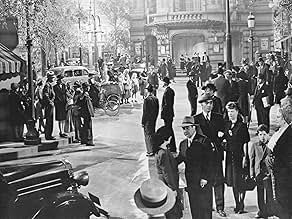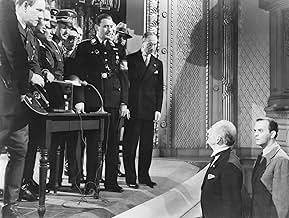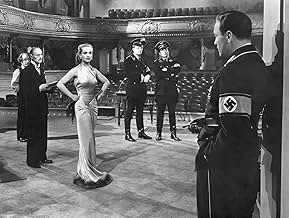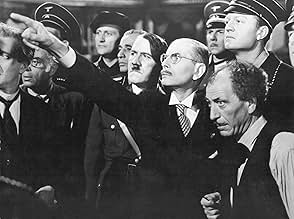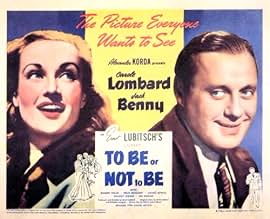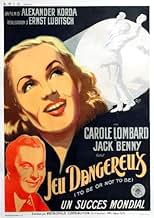Pendant l'occupation nazie de la Pologne, une troupe de comédiens se retrouve mêlée aux efforts d'un soldat polonais pour traquer un espion allemand.Pendant l'occupation nazie de la Pologne, une troupe de comédiens se retrouve mêlée aux efforts d'un soldat polonais pour traquer un espion allemand.Pendant l'occupation nazie de la Pologne, une troupe de comédiens se retrouve mêlée aux efforts d'un soldat polonais pour traquer un espion allemand.
- Réalisation
- Scénario
- Casting principal
- Nommé pour 1 Oscar
- 5 victoires et 2 nominations au total
- Polish RAF Pilot
- (non crédité)
- German Soldier
- (non crédité)
Résumé
Avis à la une
Easily the best of the screen versions. The cast is tight and the timing is impeccable. You can really tell that the cast believed in the film. Since America had not taken a formal stance at the time this went into production the producers, cast, and crew were really making something revolutionary and controversial. So much so that the making of this movie was not even mentioned on the Jack Benny radio program. Which is a major deal for those familiar with Old Time Radio, Jack's film career provided excellent material for comedy writers on the radio show, but also the radio show was an excellent opportunity to promote a movie. It is doubtful that this was a missed opportunity, what is more likely is that his sponsor or perhaps the network did not want to advocate a position.
This movie is wonderful for so many reasons. Not only is it hilarious, there is suspense, intrigue, and history. Another poster, mentions the Nazi's jumping out of the plane at the order of a radio transmission by Hitler. The thing to remember here is that the Nazi army was seen as an unstoppable war machine, so efficient, that soldiers would commit suicide if asked. This was less humor than it was to evoke fear of fascism.
Everyone remembers Bob Hope and his travels during WWII, well Jack Benny and Carole Lombard were no slouches either. After all they made this movie. Carole died in a plane crash along with her mother and twenty others returning from a war bond rally before the film was released. Jack went where few if any cameras or radio transmitters could reach. He could be found in the most remote parts of the world entertaining the troops. Not to take anything from Bob, he went there as well, he just had more photo ops.
Bottom line watch this movie--twice, maybe more, the dialogue is so quick and witty there is a good chance you might miss it the first time, them again it is worth at least to looks.
Lubitsch was, by this time, coming to the end of an exquisite career that defined the nature of sophistication in 'light' cinema. 'To Be or Not To Be' skips lightly over all of the minefield of a subject like this and it is difficult or impossible to think of any other filmmaker who might have managed it (if you look at Mel Brooks' limp remake, you can see why).
In 1996, I presented a massive season of 'the greatest' films in Belfast for the centenary of cinema - 250 titles in 9 months. Of all of them, this was the film which got the greatest ovation - about 5 minutes with a nearly full house standing and applauding! They may have applauded for many reasons, but here are certainly some of them...
The very complicated narrative is presented virtually flawlessly and the comedy is never allowed to hold up the narrative. The principle actors - Carole Lombard (breathtakingly beautiful) and Jack Benny in particular, but many of the supporting cast as well - throw themselves into the affair with a gusto that is completely infectious. Apart from the satirical aspect of the story and the way in which Hitler and the Nazis are mercilessly ridiculed for their authoritarianism and the fear which is their only motivator, the film pokes gentle fun at the vanity of actors in a warm and happy manner. Finally, and most important, is the notion of farce. Farce rarely works in the cinema, but here it does, and in the grand manner - just look at how many times the situation regarding Professor Siletsky changes profoundly during the film - it is dizzying - yet the characters manage to come up with (often self-defeating or inappropriate) schemes on every occasion.
This is a wonderful work that, I have no hesitation in saying, is absolutely vital for anyone who wants to really understand the glory of the cinema. But to answer Dilys Powell's question... yes, the joke is deliriously funny.
A cracking comic-caper, it follows a troupe of Polish actors who find themselves performing the roles of their lives- not on stage, but in Nazi-occupied Warsaw. When a young pilot is caught up in a spy plot, the troupe leaps into action, donning disguises, bluffing Gestapo officers and improvising as if their lives (and country) depend on it. At the centre is Benny's Joseph Tura, the pompous Hamlet-in-residence, and Lombard, as his wife Maria, luminous and quick-witted in what was sadly her final screen role.
The film effortlessly juggles tones. One moment it's pure farce- theatrical egos, slippery identities and a Hamlet with more flair than sense- and the next, it glances at real peril with a surprisingly steady gaze. Beneath the laughs, there's a pointed satire about authoritarianism, vanity and the roles people play to survive. The dialogue crackles with razor-sharp wit, every line balanced like a dagger on the edge of a laugh. Whether it's Benny's oblivious grandiosity or Lombard's wry deflections, Lubitsch keeps the script dancing- light on its feet, but never light on substance.
That Lubitsch made this film at the height of the Second World War is nothing short of astonishing. While Hollywood largely played it safe, he aimed straight for the absurd heart of fascism, daring to laugh. But this isn't mockery for its own sake- Lubitsch understood that ridicule, when wielded with precision, can be a subversive weapon. His satire is never cruel, but it is fearless: mocking vanity, the ridiculousness of the Nazi ideology, exposing cowardice; reminding us that even in the darkest times, a well-delivered line- or a perfectly timed pause- can carry a kind of truth that outlasts bombs and bluster.
Visually, the film is no slouch either. The production design conjures a grand theatrical world, full of velvet curtains, dressing rooms and shadowy corridors. Rudolph Maté's cinematography adds a crisp elegance, framing scenes with the same precision Lubitsch brings to the dialogue. It's handsome without being showy, stylish without upstaging the script; perfectly suited to the unfolding farce.
The cast is uniformly excellent, but it's Benny and Lombard who give the film its centre of gravity- or, rather, its comic orbit. Benny, one of the all-time comedic greats, leans gleefully into Joseph Tura's preening vanity, delivering a performance that's both absurd and oddly endearing. He plays a man desperate to be taken seriously, even as the world refuses to play along- a joke that never stops landing.
Lombard, by contrast, is all grace and mischief. Her Maria is a master of timing, charm and quiet control. She brings a knowing sparkle to every scene she's in. Sadly, Lombard would die before the film finished post-production- in this way it acts as a sterling swansong for a cinematic legend. Around them, the supporting players- from Sig Ruman's delightfully blustering colonel to Robert Stack's earnest pilot- flesh out a world where everyone, it seems, is playing to the gallery, even when the stakes are deadly.
Ernst Lubitsch's 'To Be or Not to Be' is a marvel- a film daring to be funny when all signs point to despair. It's sharp, silly and strangely stirring, a comedy that looks evil in the face and responds with a raised eyebrow and a perfectly arched punchline. In a world too often content to play it safe, Lubitsch reminds us that the boldest laughs are the ones that speak the hardest truths. Strongly acted and beautifully shot, 'To Be or Not to Be' ultimately proves that in the face of tyranny, the best answer is always to be- to laugh, to fight and to defy.
When I was 16 (20 years ago, sigh...), this was re-released for a short time in a local art-house cinema, and my father insisted I go watching it with a friend. Well, teenagers don't normally line up to see 50 year old black and white comedies, but - man, was I glad I did!
This is a pitch black comedy that feels as fresh today as it must have then; in fact, this must have been kind of a shock in 1942. There are no cheesy clean characters or cringe-worthy lines: this is a firework of fast, witty dialogue with an edge and the sexiest, cleverest (and most morally ambiguous) female protagonist I have ever seen in a film before the "New Hollywod" era.
Even the structure and the way the story evolves are very modern; there are flashbacks and twists and turns that might be very common in contemporary films but must have seemed almost "avant-garde" at the time.
The biggest fun, of course, is how Lubitsch takes the pi** out of Hitler's blind, fanatic followers. I don't believe the Nazis have ever been mocked better than in this comedy masterpiece (and I only hope old Adolf has seen it, too). Mel Brooks' remake is not bad, but the original is simply killer.
See it, and then see it again (and again).
Priceless. 10 out of 10
Favorite films: http://www.IMDb.com/list/mkjOKvqlSBs/
Lesser-known Masterpieces: http://www.imdb.com/list/ls070242495/
Favorite Low-Budget and B-Movies: http://www.imdb.com/list/ls054808375/
Favorite TV-Shows reviewed: http://www.imdb.com/list/ls075552387/
Le saviez-vous
- AnecdotesWhen Jack Benny's father went to see this movie, he was outraged at the sight of his son in a Nazi uniform in the first scene and even stormed out of the theater. Jack convinced his father that it was satire, and he agreed to sit through all of it. His father ended up loving the film so much he saw it forty-six times.
- GaffesAlthough having Maria Tura give the cue line "To be or not to be" to the men in the audience she wishes to meet in her dressing room is a very funny premise of the film, it actually would be highly impractical for Maria to think she would have time to meet backstage. Hamlet's "To be or not to be" soliloquy is only about 3-4 minutes long and Ophelia has the very next line in the play (in fact Hamlet announces her entrance at the end of his soliloquy), which would barely give Maria any time to meet men in her dressing room.
- Citations
Joseph Tura: [disguised as Professor Siletsky - speaking about Maria Tura] Her husband is that great, great Polish actor, Josef Tura. You've probably heard of him.
Colonel Ehrhardt: Oh, yes. As a matter of fact I saw him on the stage when I was in Warsaw once before the war.
Joseph Tura: Really?
Colonel Ehrhardt: What he did to Shakespeare we are now doing to Poland.
- Versions alternativesIn Poland, a brief introduction was edited in. Polish actor Kazimierz Rudzki assured the audience that the movie was done with best intentions by their "American friends". At the time the movie screened in Poland, many people still lived in trauma from the events of World War II; few could find comedy in the German invasion of Poland, instead finding the movie in poor taste, offensive, or hard to swallow.
- ConnexionsFeatured in Showbiz Goes to War (1982)
- Bandes originalesPolonaise in A major, Op. 40, No. 1, 'Military'
(1838) (uncredited)
Written by Frédéric Chopin
Orchestral arrangement by Aleksandr Glazunov
Heard during the opening and closing credits
Meilleurs choix
- How long is To Be or Not to Be?Alimenté par Alexa
Détails
Box-office
- Montant brut aux États-Unis et au Canada
- 3 270 000 $US
- Montant brut mondial
- 4 578 000 $US
- Durée
- 1h 39min(99 min)
- Couleur
- Rapport de forme
- 1.37 : 1

